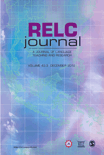
RELC Journal
Scope & Guideline
Advancing Knowledge in Education and Linguistics
Introduction
Aims and Scopes
- Innovative Pedagogical Practices:
The journal emphasizes research that explores new and effective teaching methodologies in language education, including task-based learning, collaborative learning, and the integration of digital tools. - Teacher Development and Identity:
A significant focus is placed on the professional growth and identity development of language teachers, examining how their experiences and beliefs shape their teaching practices. - Technology Integration in Language Learning:
The RELC Journal highlights the use of technology in language education, including AI-assisted learning tools, online platforms, and digital resources that enhance language acquisition. - Research on Language Assessment:
The journal includes studies on language assessment literacy, feedback mechanisms, and innovative assessment strategies that support language learners' progress. - Cultural and Contextual Perspectives:
Research that addresses the impact of cultural and contextual factors on language learning and teaching practices is a core area of interest, reflecting the diverse backgrounds of learners and educators. - Translanguaging and Multilingualism:
The journal explores the phenomenon of translanguaging and its implications for language teaching, focusing on how multilingual practices can enrich language education.
Trending and Emerging
- Artificial Intelligence in Language Education:
An increasing number of studies focus on the role of AI technologies in language learning, including AI-assisted writing tools, chatbots, and personalized learning experiences. - Online and Hybrid Learning Environments:
Research into the effectiveness of online and hybrid language teaching methods has surged, particularly in response to the COVID-19 pandemic, highlighting strategies for engaging learners in virtual settings. - Emotional and Identity Dimensions in Language Learning:
There is a growing interest in exploring the emotional aspects of language learning, including how identity and agency influence learners' experiences and motivations. - Gamification and Engagement Strategies:
Emerging studies are investigating the use of gamification in language learning, focusing on how game-based elements can enhance learner engagement and motivation. - Critical Pedagogy and Social Justice in Language Teaching:
Research that intersects language education with themes of social justice, equity, and inclusivity is becoming increasingly prominent, reflecting a commitment to addressing systemic issues within the field. - Collaborative Learning and Peer Feedback:
There is a notable trend towards examining collaborative learning approaches and the role of peer feedback in enhancing language learners' skills and confidence.
Declining or Waning
- Traditional Language Teaching Methods:
There is a noticeable decline in research centered around traditional, teacher-centered language teaching methodologies, as newer, more interactive and student-centered approaches gain traction. - Focus on Native Speaker Norms:
Research emphasizing the superiority of native speaker norms in language teaching and assessment is becoming less prevalent, with an increasing recognition of the validity of diverse Englishes and multilingual contexts. - Monolingual Approaches to Language Learning:
The emphasis on monolingual teaching strategies is waning as more studies advocate for bilingualism and multilingual practices, reflecting a broader understanding of language use in diverse settings.
Similar Journals
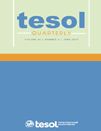
TESOL QUARTERLY
Advancing Language Education through Rigorous ResearchTESOL Quarterly, published by Wiley, is a premier academic journal in the fields of Education and Linguistics, noted for its significant contributions to the study of Teaching English to Speakers of Other Languages. Since its inception in 1981, this journal has established itself as a vital platform for researchers and educators, emphasizing empirical studies, innovative teaching practices, and critical reviews that inform policy and pedagogy. With an impressive impact factor, it consistently ranks in the Q1 Quartile across multiple categories in both Education and Linguistics, highlighting its influence and reach within the scholarly community. The journal boasts strong Scopus rankings, placing it in the top 96th percentile among related publications, further affirming its essential role in disseminating cutting-edge research. Although it does not offer open access, TESOL Quarterly remains dedicated to promoting high-quality scholarship that advances the understanding of language education practices globally.
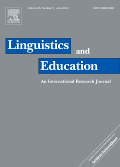
Linguistics and Education
Fostering Dialogue Between Linguistics and Educational StrategiesLinguistics and Education, published by Elsevier, is a premier journal dedicated to advancing the understanding of the intersections between linguistics and educational practices. With its ISSN 0898-5898 and E-ISSN 1873-1864, this journal has established itself as a significant platform since its inception in 1988, continuing to produce impactful research up to 2024. It enjoys a prestigious Q1 ranking in both the Education and Linguistics and Language categories, reflecting its high-quality contributions and leading role in the field. The journal’s Scopus rankings further underscore its influence, being placed in the 87th percentile for Arts and Humanities in Language and Linguistics, and the 86th percentile in Social Sciences in Linguistics and Language. Although it operates under traditional subscription access, its contributions are essential for researchers, professionals, and students alike, making substantial strides in the understanding of language, learning environments, and pedagogical strategies. The journal's objective is to foster interdisciplinary dialogue and disseminate innovative research that informs educational policy and practice.
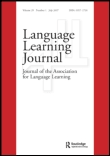
Language Learning Journal
Exploring the frontiers of language learning methodologies.Welcome to the Language Learning Journal, a premier resource for researchers, educators, and linguists alike, published by Routledge Journals, Taylor & Francis Ltd. With a proud history dating back to 1990 and commitment to advancing the exploration of language acquisition, this esteemed journal boasts an impressive impact factor within Q1 rankings across both the Education and Linguistics and Language categories. Ranked #40 in Language and Linguistics and achieving a 96th percentile in the Arts and Humanities, the journal serves as a crucial platform for disseminating cutting-edge research, innovative methodologies, and impactful discussions in the field of language learning. Although currently not offered as an open access publication, the depth and quality of content ensure significant contributions to the body of knowledge for professionals and scholars. With its global reach, the Language Learning Journal is dedicated to fostering the development and understanding of language learning processes, enabling readers to stay informed about the latest trends and findings through rigorous peer-reviewed articles.
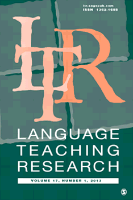
Language Teaching Research
Unveiling the complexities of language acquisition.Language Teaching Research, published by SAGE Publications Ltd, serves as a pivotal platform for scholars and practitioners in the domains of education and linguistics. Since its inception in 1997, this prestigious journal has maintained its status within the Q1 category for both Education and Linguistics, symbolizing its significant impact and commitment to excellence in research. With impressive Scopus rankings placing it among the top percentile in its fields, Language Teaching Research provides a comprehensive array of articles, studies, and reviews dedicated to advancing the theory and practice of language education. Although currently not an Open Access journal, it remains essential reading for those engaged in the evolving challenges and methodologies surrounding language teaching and learning. The journal aims to foster insightful discussions and disseminate innovative research findings, making it a crucial resource for educators, researchers, and students keen on enhancing language acquisition and pedagogical strategies.

Taiwan Journal of TESOL
Elevating TESOL Practices with Rigorous ScholarshipTaiwan Journal of TESOL, published by CRANE PUBL CO, serves as a vital platform for research in the fields of Education and Linguistics. Established to advance the field of Teaching English to Speakers of Other Languages, this journal provides a diverse range of scholarly articles aimed at enhancing pedagogical practices, understanding language acquisition, and facilitating cross-cultural communication. With a convergence of research years from 2017 to 2024, it proudly holds its position within the quartile rankings of Q4 in Education and Q2 in Linguistics and Language. The journal’s Scopus ranks notably place it in the 61st percentile for Language and Linguistics among Arts and Humanities, making it a respected resource for both seasoned scholars and emerging researchers. While it currently does not offer open access, the journal remains committed to making its contributions available to the academic community. The ISSN numbers are 1814-9448 and 2076-7617 for print and electronic formats, respectively, ensuring accessibility to a global audience. As a leading publication within its domain, the Taiwan Journal of TESOL invites submission of innovative research that shapes the future of language education.

LANGUAGE LEARNING & TECHNOLOGY
Exploring the Future of Language EducationLANGUAGE LEARNING & TECHNOLOGY, published by the University of Hawaii's National Foreign Language Resource Center, stands as a pioneering platform within the realms of linguistics, education, and computer science applications. With an impressive impact factor and esteemed rankings—achieving Q1 in Education and Q1 in Linguistics and Language—this open-access journal has been disseminating critical research since its inception in 1997. The journal operates under a commitment to fostering innovative approaches to language learning through technology, making it invaluable for researchers, educators, and practitioners seeking to enhance their understanding of this dynamic intersection. Hailing from the United States, the journal not only promotes scholarly dialogue but also champions accessibility to knowledge, ensuring that the latest advancements in language learning and technology are readily available to a global audience. With converged years documented from 1997 to 1998 and from 2000 to 2021, LANGUAGE LEARNING & TECHNOLOGY continues to play a pivotal role in shaping contemporary discussions around language education and the influence of technology on learning methodologies.
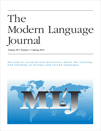
MODERN LANGUAGE JOURNAL
Elevating Scholarly Discourse in Linguistics and Language StudiesThe MODERN LANGUAGE JOURNAL, published by WILEY, stands as a premier academic resource in the field of linguistics and language studies. With its strong legacy dating back to 1916, this journal has evolved to address contemporary issues and trends in language learning, teaching, and research. It holds a prestigious Q1 ranking in both Linguistics and Language categories as of 2023, reflecting its high impact and relevance in scholarly discourse, supported by notable Scopus rankings that place it in the top percentiles of its field. The journal serves as an essential conduit for researchers, educators, and students seeking to contribute to and stay abreast of advancements in language education and linguistic theory. Although it does not currently offer open access options, the journal remains committed to disseminating significant findings that inspire innovative methodologies within the realm of modern languages.

Journal of Asia TEFL
Elevating Pedagogical Practices in a Globalized ContextWelcome to the Journal of Asia TEFL, a leading peer-reviewed platform dedicated to exploring the intersections of English language education, linguistics, and the dynamic educational landscapes of Asian contexts. Published by ASIA TEFL in South Korea, this journal has emerged as a pivotal resource for academia since its inception in 2004, with consistently expanding influence reflected in its Scopus rankings, including a notable 76th percentile in Linguistics and Language. With a focus on the evolving methodologies and pedagogical innovations in English language teaching, the journal aims to foster scholarly discussions that enhance teaching practices and policy-making in a globalized world. Although it currently operates without open access, its rigor and relevance in categories such as Education and Linguistics ensure that it remains a valuable asset for researchers, educators, and students seeking to advance their knowledge and practice within this vital field of study.

Language Learning in Higher Education
Pioneering insights into contemporary language education challenges.Language Learning in Higher Education is a prominent academic journal published by DE GRUYTER MOUTON, dedicated to exploring the intricate dynamics of language acquisition and pedagogical practices within the higher education context. With a robust ISSN: 2191-611X and E-ISSN: 2191-6128, this journal provides a platform for innovative research that addresses contemporary challenges and methodologies in language education. The journal enjoys a favorable reputation in the academic community, as evidenced by its ranks in the Scopus database, where it holds a position in the 67th percentile for Language and Linguistics and is classified in the Q3 and Q2 quartiles across relevant education and linguistics categories. Since its convergence in 2017, Language Learning in Higher Education aims to enrich scholarly discourse by publishing high-quality articles that foster insights into effective language learning strategies, thus serving as an essential resource for researchers, educators, and students committed to enhancing language education. The journal's editorial team is devoted to advancing the field through rigorous peer-review processes and welcomes contributions that push the boundaries of language learning research.
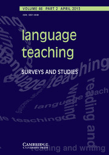
Language Teaching
Shaping the landscape of language education since 1969.Language Teaching, published by Cambridge University Press, is a premier peer-reviewed journal that has been at the forefront of the linguistics and language education field since its inception in 1969. With an impressive impact factor positioning it in the top tier (Q1) of its category, this journal is ranked 22nd among 1,088 in the Arts and Humanities field and maintains an outstanding 98th percentile ranking. Focusing on innovative research and methodologies in language teaching and learning, Language Teaching provides a vital platform for discussing the latest developments in pedagogy, applied linguistics, and curriculum design. Although it does not offer open access options, it reaches a broad audience of researchers, educators, and practitioners dedicated to enhancing language instruction across various contexts. The journal continues to evolve, with plans to cover emerging trends and challenges in language education until 2024, making it an essential resource for anyone invested in the teaching of languages.